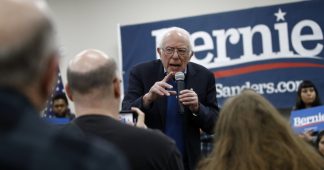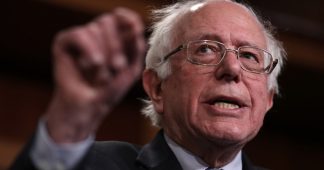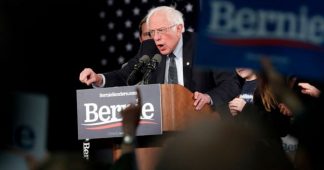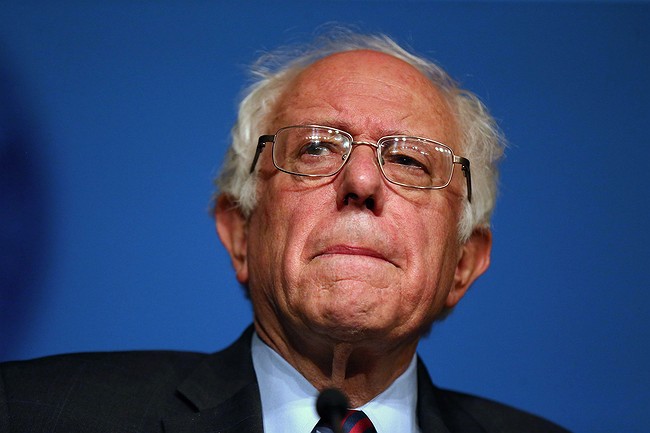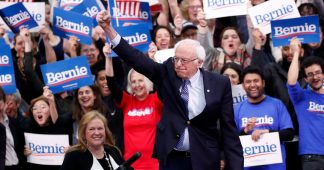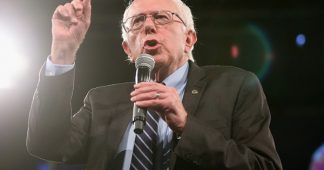Wednesday’s debate confirmed it: Democratic elites are willing to steal the nomination from Bernie Sanders at this summer’s convention in Milwaukee even if he has the most delegates, and no other candidate will lift a finger. We need a plan to stop them.
By Sam Lewis and Beth Huang
02.21.2020
If Sanders goes to the convention with a plurality (as of this writing Five Thirty Eight predicts a 41 percent chance of a contested convention), the nomination vote will go to a second round, when the portion of the 3,979 convention delegates who are pledged to other candidates will be freed to horse-trade with each other, and the 771 superdelegates will also be able to vote. While the Democratic establishment has no avenue to overturn a socialist victory in a congressional primary, at the DNC, an alliance of delegates from other candidates and superdelegates could hand the nomination to an alternative candidate.
Superdelegates are a cross section of the Democratic establishment. They are US Senators, members of Congress, governors, state legislators, party officials, operatives, and labor leaders. A majority of superdelegates are sitting elected officials and political candidates. Many of these establishment figures have spent five years mounting the same tired attacks on Sanders — he’s an old, white man, he’s not a “real” Democrat, he’s too far left to be electable, or, in the words of Hillary Clinton, “nobody likes him.” These arguments haven’t convinced Democratic voters, but they also obscure the real reason Sanders provokes such strong opposition from this layer of party leaders.
The reality is the Democratic establishment will try to use the levers of power they have to stop Bernie — namely, a second-round intervention by the superdelegates — because he is an avowed democratic socialist who rejects all corporate donations, advocates for single-payer health care and a Green New Deal, and will advance a tax plan that will dramatically change the distribution of wealth in America. For the donor class who shape the Democratic Party’s priorities, and the elected officials and operatives whose career paths have progressed hand-in-hand with those donors, Bernie represents an existential threat to their business model and their political model.
In the event that the convention is contested or stolen, the “DemExit” strategy, a 2016 attempt to form a new third party by splitting Sanders supporters from the Democratic Party, will likely reemerge. Without a clear avenue to supplant either of the two major parties, DemExit risks spoiling elections for the Republicans. Additionally problematic, DemExit takes the social movement left out of a contest for power that we are currently winning. The Sanders campaign and coalition represent the greatest threat to corporate power in the party since its decisive turn towards neoliberalism in the 1970s. No one will breathe a bigger sigh of relief than the party establishment if we, the movement behind Sanders, pack our bags and go home.
Another response to a contested or stolen convention will be further pushes for internal reform to the party’s nomination procedures. Since 1968 progressives have successfully advanced democratic changes, and it is only thanks to such reforms after the 2016 convention that superdelegates are no longer able to vote in the first round. But the movement behind Sanders should be very wary of turning our attention in this direction. The average voter has little input over these reforms, which are inherently the product of backroom negotiations. Endless negotiations over procedural minutia will sap the momentum of the Sanders movement.
Instead of the dead end of DemExit or potentially demobilizing fight around party reform, the Left needs a strategy that will keep the Sanders base unified and mobilized around its core demands. We need a plan that has a chance of overcoming opposition from superdelegates at the convention, that keeps party elites as our key target inside the party, and that provides us a path forward after July, win or lose.
Sanders supporters should be preparing now for mass mobilizations to demand that superdelegates respect the will of the voters, and should articulate an explicit strategy to remove those who don’t concede to that demand. We can have the most impact by keeping our focus on the slight majority of superdelegates who are national, state, or local elected officials who the Sanders base can hold accountable through primary elections, and the dozens who are labor leaders elected by their own members to represent their interests.
A coalition of national membership organizations has already formed to support Bernie. Our organization, Democratic Socialists of America, has joined Center for Popular Democracy Action, People’s Action, Sunrise, Make the Road, Mijente, and Dream Defenders to build a powerful outside movement to propel the political revolution. As the social movement organizations behind Sanders, we need a shared strategy in the event of a contested convention.
We can start pressuring superdelegates right now. In the lead up to the DNC, we propose holding town halls in the districts of elected officials who are superdelegates and build on our networks of democratic-socialist union members to pressure superdelegate union officers. Once state contests wrap up, our organizations can harness statewide campaign infrastructures for Bernie to continue canvassing and raising funds in superdelegates’ districts to explicitly lay the groundwork for future primary challenges. This will be especially successful if we keep reaching out to working-class and immigrant voters, the backbone of the Sanders’s support.
Of course, it’s essential that we also take our struggle to the streets. Imagine the crisis within the upper echelons of the Democratic Party when our organizations unite to disrupt “business as usual” in Washington, DC, or state capitols through direct action and civil disobedience in the buildup to a mass protest of 100,000 at the convention itself to demand a democratic outcome.
If superdelegates do vote to kill the political revolution in July, they should be taking that vote with the absolute certainty that the organized working class in this country will use civil disobedience, mass protest, and primary election challenges to exact retribution and remove them from office. In the worst-case scenario, where they are successful at stopping Sanders, we will have a game plan to take millions of voters to war with the Democratic Party elite. But a mobilization of this scale might also be powerful enough to deliver Sanders an outright victory. While party elites have resources and undemocratic levers of power that we do not, they are also few in number. With a plan, organization, and a mass movement on our side, we can win the convention in July, win the election in November, and begin the next phase of the struggle to transform American democracy.
Published at www.jacobinmag.com
